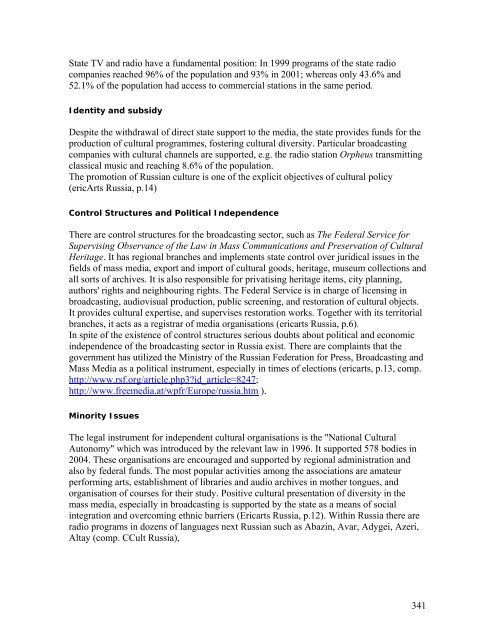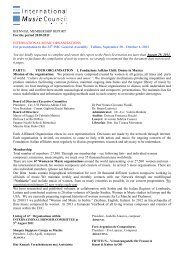- Page 1 and 2:
Appendices The Protection and Promo
- Page 3 and 4:
The complementarity or reciprocity
- Page 5 and 6:
• La diversité musicale n’a,
- Page 7 and 8:
musical genre it is concerned with.
- Page 9 and 10:
• Cite examples where they are in
- Page 11 and 12:
- right to fund national broadcaste
- Page 13 and 14:
a) Apart from ANART (National Agenc
- Page 15 and 16:
Algérie, il ne reste plus que sept
- Page 17 and 18:
Appendix 7 The Protection and Promo
- Page 19 and 20:
and Algerian) ra’i which goes wel
- Page 21 and 22:
their source in the centuries-old t
- Page 23 and 24:
Rabab” ceremonies to charities fi
- Page 25 and 26:
- Morocco is one of the countries w
- Page 27 and 28:
Appendix 8 The Protection and Promo
- Page 29 and 30:
Muqam of Xinjiang” and the “Mon
- Page 31 and 32:
and opinion in the world that the C
- Page 33 and 34:
Trade Fair, 21 foreign investment p
- Page 35 and 36:
Appendix 9 The Protection and Promo
- Page 37 and 38:
that this is because the dance prod
- Page 39 and 40:
We have no sample. 18. The standard
- Page 41 and 42:
- Subsidy. Are there regulations th
- Page 43 and 44:
• follow whatever the people do.
- Page 45 and 46:
and values in music. Some people in
- Page 47 and 48:
- the right to regulate in favour o
- Page 49 and 50:
Appendix 10 The Protection and Prom
- Page 51 and 52:
• Cite examples of the use of mus
- Page 53 and 54:
equire that all applicants for subs
- Page 55 and 56:
Andrew Lum, Singaporean composer ba
- Page 57 and 58:
Appendix 11 The Protection and Prom
- Page 59 and 60:
cultural characteristics: all those
- Page 61 and 62:
aggressors. At that situation, all
- Page 63 and 64:
the demands and rhythm of modern so
- Page 65 and 66:
RESPONSE: No such requirements we h
- Page 67 and 68:
the festival organizers endeavour t
- Page 69 and 70:
sleep. After the events that our fo
- Page 71 and 72:
Appendix 12 The Protection and Prom
- Page 73 and 74:
have a Bill of Rights, so there is
- Page 75 and 76:
• Cite examples of the use of mus
- Page 77 and 78:
music. Much of the television progr
- Page 79 and 80:
works in more subtle ways. For more
- Page 81 and 82:
musics into the open. Many musician
- Page 83 and 84:
in some way becomes ‘our’ music
- Page 85 and 86:
There is such diversity in Australi
- Page 87 and 88:
such domination, in many countries
- Page 89 and 90:
Appendix 13 The Protection and Prom
- Page 91 and 92:
- Government agency, New Zealand Tr
- Page 93 and 94:
Zealand’s cultural diversity, inc
- Page 95 and 96:
- project benefits art in New Zeala
- Page 97 and 98:
7. diversity - in the sense of the
- Page 99 and 100: necessary to accord more favourable
- Page 101 and 102: Appendix One (Additional informatio
- Page 103 and 104: Appendix Two (Website Links) • Cr
- Page 105 and 106: Appendix 14 The Protection and Prom
- Page 107 and 108: SPAIN..............................
- Page 109 and 110: 4.3 EDUCATION .....................
- Page 111 and 112: Polina Introduction Musical Diversi
- Page 113 and 114: society aiming long-term perspectiv
- Page 115 and 116: music practice that is still "alive
- Page 117 and 118: this promotes essentialist and nati
- Page 119 and 120: derivates, which are often understo
- Page 121 and 122: y the infusion of central European
- Page 123 and 124: The still continuing oppression of
- Page 125 and 126: Chancellery and main institutions i
- Page 127 and 128: increasing on cultural projects. Th
- Page 129 and 130: http://www.musicfrom.nl/popnaardeto
- Page 131 and 132: throughout the world. The Music Exp
- Page 133 and 134: CHARITY CONCERTS, CROATIA During th
- Page 135 and 136: peace building. The tour includes,
- Page 137 and 138: Music Fund is an initiative of Belg
- Page 139 and 140: Ukraine Some musicians supported th
- Page 141 and 142: Public and private services are gen
- Page 143 and 144: 333
- Page 145 and 146: 2002-2006 management agreement betw
- Page 147 and 148: identically worded Interstate Agree
- Page 149: licensing. The SEM shall guarantee
- Page 153 and 154: On "the Other" hand, another interv
- Page 155 and 156: esources restricts usability and ex
- Page 157 and 158: In many countries there are explici
- Page 159 and 160: EXAMPLE 3: BULGARIA Music is a subj
- Page 161 and 162: Concerts in Schools Rikskonsertene
- Page 163 and 164: References to other sections This s
- Page 165 and 166: Belgium's government to set up part
- Page 167 and 168: Government provides a subsidy curre
- Page 169 and 170: public. The idea was changed into a
- Page 171 and 172: controversial point in the governme
- Page 173 and 174: CONCLUSION: MUSICAL DIVERSITY AND C
- Page 175 and 176: Cultural and musical disbalances of
- Page 177 and 178: Thus neither Denmark nor Sweden has
- Page 179 and 180: "bastard". This identity of being a
- Page 181 and 182: WOMAD was originally inspired by Pe
- Page 183 and 184: artists are the children or grandch
- Page 185 and 186: coloured by local traditions. All o
- Page 187 and 188: - contacting associations and insti
- Page 189 and 190: 6.10 Research about music and music
- Page 191 and 192: political problems. It can easily a
- Page 193 and 194: and venues could not survive withou
- Page 195 and 196: for copyrights and to distribute mo
- Page 197 and 198: effective deliverers of activity. I
- Page 199 and 200: music workers, as well as the promo
- Page 201 and 202:
Musical Practice (making music) is
- Page 203 and 204:
that is unique in Europe and that c
- Page 205 and 206:
Appendix 15 The Protection and Prom
- Page 207 and 208:
MUSIC DIVERSITY QUESTIONNAIRE 1. Th
- Page 209 and 210:
§ In pursuit of the objective of i
- Page 211 and 212:
consumers of piracy. Blanco y Negro
- Page 213 and 214:
http://es.wikipedia.org/wiki/Venezu
- Page 215 and 216:
Peoples Commissioner said that amon
- Page 217 and 218:
In a new elementary education refor
- Page 219 and 220:
The following diagram shows the pyr
- Page 221 and 222:
Argentina Bolivia Brasil Chile Colo
- Page 223 and 224:
§ Venezuela: Musical Mind is an in
- Page 225 and 226:
Paraguay: Diego Sánchez Haase y Lu
- Page 227 and 228:
include the attitudes of younger ge
- Page 229 and 230:
5. Governmental projects, civil org
- Page 231 and 232:
Appendix 16 The Protection and Prom
- Page 233 and 234:
interest. Funds collected served mo
- Page 235 and 236:
Appendix 17 The Protection and Prom
- Page 237 and 238:
INTRODUCTION This report is the res
- Page 239 and 240:
operators. Consequently, this resul
- Page 241 and 242:
The traditional music still lacks v
- Page 243 and 244:
Appendix 18 The Protection and Prom
- Page 245 and 246:
consultants on the IMC musical dive
- Page 247 and 248:
In far more general terms, albeit w
- Page 249 and 250:
• Contracts - comparison to inter
- Page 251 and 252:
• Inadequate and outdated copyrig
- Page 253 and 254:
a large number of quality artists,
- Page 255 and 256:
IV. The standards regulating musica
- Page 257 and 258:
There was a resulting report of Nov
- Page 259 and 260:
15. Within an emerging framework of
- Page 261 and 262:
65. Discussions are taking place wi
- Page 263 and 264:
International airport. Last year au
- Page 265 and 266:
VI. The manner in which musical div
- Page 267 and 268:
VII. The obstacles or challenges to
- Page 269 and 270:
VIII. Bring to light those good pra
- Page 271 and 272:
of the Standards Generating Body (S
- Page 273 and 274:
Addendum 1 IMC MUSICAL DIVERSITY PR
- Page 275 and 276:
2006 - Vuka: reach for a new life O
- Page 277 and 278:
LETTER OF RECOMMENDATION BY PROF. M
- Page 279 and 280:
Palissander Samspel Peace Programme
- Page 281 and 282:
Sikhulekele Ukuthula (We pray for p
- Page 283 and 284:
Vereeniging and began a door-to-doo
- Page 285 and 286:
Ewo, oh dear! Let us pray for one m
- Page 287 and 288:
• To develop information on Amasi
- Page 289 and 290:
development of the arts industry in
- Page 291 and 292:
Funding criteria: • The NAC striv
- Page 293 and 294:
SAMRO has in excess of 3850 compose
- Page 295 and 296:
Radio, Television and Print Media O
- Page 297 and 298:
Zakheni Music Trust The co-founder
- Page 299 and 300:
Contact: Stanley Nkosi Tel: (011) 3
- Page 301 and 302:
producers/performers regarding the
- Page 303 and 304:
The MITT recommends the implementat
- Page 305 and 306:
In this context, the MITT recommend
- Page 307 and 308:
• The Ombudsman pays special atte
- Page 309 and 310:
Recommendation 23: The MITT recomme
- Page 311 and 312:
Recommendation 31: The MITT recomme
- Page 313 and 314:
Addendum 4 Media Development and Di
- Page 315 and 316:
Addendum 5 SOUTH AFRICAN MUSIC REGU
- Page 317 and 318:
Addendum 6 Act SOUTH AFRICAN MUSIC
- Page 319 and 320:
5.2 The logs, statistical forms and
- Page 321 and 322:
♦ Have local musical arts artiste
- Page 323 and 324:
Addendum 8 MUSIKHANE COMMUNITY PROJ
- Page 325 and 326:
The general aim of Musikhane is to
- Page 327 and 328:
• Voice The Gauteng Department of
- Page 329 and 330:
• In September two of the Grade 1
- Page 331 and 332:
With only one electronic piano on w
- Page 333 and 334:
instruments and it was soon only th
- Page 335 and 336:
In Melodi ya Mamelodi we generate n
- Page 337 and 338:
Addendum 10 An Investment for the F
- Page 339 and 340:
THE BLACK TIE INCUBATOR SCHEME 1. B
- Page 341 and 342:
- Under the watchful eyes and posit
- Page 343 and 344:
Young singers from diverse cultural
- Page 345 and 346:
15. BEING AN “INCUBATOR” MEANS
- Page 347 and 348:
professional chorus master, was eng
- Page 349 and 350:
Addendum 11 Sweet Voice Masters It
- Page 351 and 352:
Addendum 12 Alphabetical list of fu
- Page 353 and 354:
o Invocation from the Hills o Dance
- Page 355 and 356:
eceived tuition in composition from
- Page 357 and 358:
symphony ca 1h40 min., (2+3+3+;4321
- Page 359 and 360:
Huber and others. He also attended



